The American Red Cross, How it works:
 The operation of the Red Cross during a disaster like Katrina is an intricate lesson in object organization. The operation of the Red Cross during a disaster like Katrina is an intricate lesson in object organization.
When you volunteer to help during a crisis, you are required to take an 8 hour training class that covers everything from mass care, shelter operations, first aid/cpr certification, to understanding how to deal with crisis psychology, to sexual harassment.
During this process you register your skills or areas of expertise, which are then reviewed and analyzed to see where you can best be utilized. Then you go home and wait for them to call.
You are called and told where you need to go and what you will be doing. From that moment all of your needs such as travel, food, and lodging are taken care of by the Red Cross. You are optionally assigned a credit card, vehicle, laptop, and any other equipment or supplies you may need for your job.
Each disaster is assigned a region code and a central location is created to handle all communications and logistics as close to the disaster area as possible. In the case of Mississippi, DR871 was designated as the center number and the center was able to set up in an abandoned K-Mart building.
Several satellite dishes were placed on the roof and a team of IT experts began to lay and drop power and computer cables for the bank of computers and networks needed too process all of the information. This process was made much easier with the advent of reliable wireless hubs that allowed the networks to be set up much faster without the need for connecting the cumbersome cables as is required in a typical wired network.
Different sections performing different administrative skills are then set up each handling a specific need. This includes an important section called Mental Health, which handles the trauma of not just the victims of a disaster but that of the volunteers as well.
It is a wonderful example of American ingenuity and organization that works, a success story that we have not heard from the media as they focused on the more newsworthy failures of FEMA and the Bush Administration.
To learn more about how you can be a volunteer in the Red Cross Click Here |
Fardad Jamali is my best friend. He is also a Safety Engineer. Actually he is one of the top safety experts in the US. And that’s not just a best friend bragging.
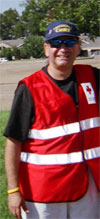 The main problem with Fardad is that wherever you drive with him, if during the trip there is the slightest traffic accident or emergency, you can count on being late. Because Fardad is that guy you see who has stopped to help. He can’t help himself. The main problem with Fardad is that wherever you drive with him, if during the trip there is the slightest traffic accident or emergency, you can count on being late. Because Fardad is that guy you see who has stopped to help. He can’t help himself.
During the Bam disaster in Iran, he followed every news report, hour by hour. Don't get him started on that!
Suffice it to say, When Katrina hit the gulf coast, Fardad was pacing back and forth in his office like a caged tiger, for days. Finally when he couldn’t stand it any longer, he made the calls to his contacts at the American Red Cross and put his name and credentials onto the volunteer list.
After a couple of days and the prerequisite training class (which he could have taught), he was notified that he was to report to Mississippi, where the eye of the storm came ashore, the scene of some of the worst destruction.
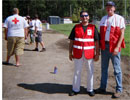 Shortly after arriving, Fardad was assigned to SAS (Safety and Security) duties. With the level of destruction and the number of displaced people, tensions and tempers were uneasily high and there was a need for security guards and people who knew how to calm people down. Not Fardad's particular area of expertise, he is more qualified than probably anyone at FEMA (it now appears) to running the whole show, performing what is known as "Incident Command and Control". Skill and expertise that Fardad has finely honed in a career spanning 16 years in Safety Engineering. But he put aside his ego and took the job, eager to help in any way he could. Shortly after arriving, Fardad was assigned to SAS (Safety and Security) duties. With the level of destruction and the number of displaced people, tensions and tempers were uneasily high and there was a need for security guards and people who knew how to calm people down. Not Fardad's particular area of expertise, he is more qualified than probably anyone at FEMA (it now appears) to running the whole show, performing what is known as "Incident Command and Control". Skill and expertise that Fardad has finely honed in a career spanning 16 years in Safety Engineering. But he put aside his ego and took the job, eager to help in any way he could.
 On his first day on the job, Fardad was assigned to help with crowd control as volunteers attempted to review thousands of people who had been displaced, record their names, assess their needs, and award them a credit card to use as needed. Sounded pretty simple enough. Until they realized that 8,000 people had lined up outside of the stadium they had taken over to handle the process. They had thought they would bring people into the processing area 300 at a time. But tensions were too high as these people who had On his first day on the job, Fardad was assigned to help with crowd control as volunteers attempted to review thousands of people who had been displaced, record their names, assess their needs, and award them a credit card to use as needed. Sounded pretty simple enough. Until they realized that 8,000 people had lined up outside of the stadium they had taken over to handle the process. They had thought they would bring people into the processing area 300 at a time. But tensions were too high as these people who had  been without anything for days and were exhausted, began to lose their patience with the officials and the processing delays. Almost all of the people at the stadium were black, and the feelings of discrimination were running at a dangerously high level as minor arguments and angry reactions began to get louder with more shoving and pushing. A local Sheriff who knew and understood the local people quickly suggested a better way to process. He suggested that they keep the people inside their cars and process them from the driver's side. Kind of like drive thru processing. This would allow people to remain seated and not have to stand, and more importantly keep everyone from being able to get out and get into angry confrontations that could escalate into fist-fights or worse. This worked much better. been without anything for days and were exhausted, began to lose their patience with the officials and the processing delays. Almost all of the people at the stadium were black, and the feelings of discrimination were running at a dangerously high level as minor arguments and angry reactions began to get louder with more shoving and pushing. A local Sheriff who knew and understood the local people quickly suggested a better way to process. He suggested that they keep the people inside their cars and process them from the driver's side. Kind of like drive thru processing. This would allow people to remain seated and not have to stand, and more importantly keep everyone from being able to get out and get into angry confrontations that could escalate into fist-fights or worse. This worked much better.
But the hours of waiting in the car caused many to run out of gas. One family's clunker sputtered and conked out right as it approached the processing line and everyone ran up to push it out of the way. The toll of waiting for hours, and the final failure of the car caused the young mother of the family to lose it and burst into tears, crying "What are we going to do? We could only get here, we have nowhere to go!"
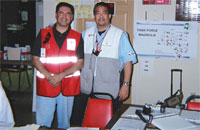 Fardad who had been running supplies back and forth from the center, asked if he could take them to the center. He was told that he couldn't do that. The reason is that the Red Cross has a controversial if not efficient policy of if it can't provide a service to everyone, they try not to provide it to individuals. This might seem unfair, or fair based on who you are in the equation. Fardad who had been running supplies back and forth from the center, asked if he could take them to the center. He was told that he couldn't do that. The reason is that the Red Cross has a controversial if not efficient policy of if it can't provide a service to everyone, they try not to provide it to individuals. This might seem unfair, or fair based on who you are in the equation.
But being an Iranian in all of this is difficult, as it was for Fardad, who simply could not stand to see this family stranded. So he devised an ingenious plan, something only an Iranian under stress could come up with. He went to them and asked them, "Does anyone want to volunteer to help me go back to the center and bring back some pizzas for the staff?"
"What?", the father of the stranded family said, dazed.
"D-o-e-s a-n-y-o-n-e w-a-n-t t-o volunteer to help bring back pizzas for the staff?" Fardad repeated slowly winking at the father.
 "What?" the father repeated still not getting it. "What?" the father repeated still not getting it.
"Because if you "volunteer" to help me bring back pizzas I can take you with me in the Jeep as a volunteer to the center." Fardad hinted as obviously as he could.
"Oh, uh, sure I can volunteer!" said the man excitedly as he grabbed his wife and belongings and threw them into the back of Fardad's car.
Once they got to the center, Fardad got them processed and off to a shelter, and as he returned back to his car to go back to the processing line, the father said, "Where do you want me to help with the pizzas?" Fardad laughed and waved at them as he drove off.
 Inside the center things were tense as families with children were being processed and assigned to shelters around the area. The Red Cross handed out kits, bags of supplies and even had coloring books and crayons, and a Disney donated Mickey doll for the kids. The traditional puritanical tradition in the US metes out reward based on merit and patience. The families were being given the packages only after they were processed. The time it was taking to process the families was hard on the children who had to sit through this and a lot of them were crying and whining. Inside the center things were tense as families with children were being processed and assigned to shelters around the area. The Red Cross handed out kits, bags of supplies and even had coloring books and crayons, and a Disney donated Mickey doll for the kids. The traditional puritanical tradition in the US metes out reward based on merit and patience. The families were being given the packages only after they were processed. The time it was taking to process the families was hard on the children who had to sit through this and a lot of them were crying and whining.
 This is unbearable for an Iranian father who wants his kids to have every toy, now. So Fardad wound up some more Iranian ingenuity and suggested that each child be given the Mickey doll as soon as the family sat down to be process, with the request that the child promise to be patient, and "take care of Mickey, while mommy talks to this nice lady." It worked. This is unbearable for an Iranian father who wants his kids to have every toy, now. So Fardad wound up some more Iranian ingenuity and suggested that each child be given the Mickey doll as soon as the family sat down to be process, with the request that the child promise to be patient, and "take care of Mickey, while mommy talks to this nice lady." It worked.
After days of this, Fardad was eventually given a day to rest. He was ordered to go and sleep. Of course he couldn't and wanted to see some of the destruction first hand. So he asked around and found that he could get close to the coast by approaching it from a specified gate, guarded by someone that one of the staffers knew. He told Fardad to take all the ice and cold water he could to the gate and he would be allowed into the disaster area.
 After he had been allowed through, he was amazed at what he saw. At first about a mile from the coast, he saw homes with just their roofs blown off. Slowly as he got closer to the water's edge, he saw 2 of the 4 walls gone, then as he got even closer, all 4 walls were gone, but debris was scattered around, and finally as he got to within 500 yards of the coast, nothing but the concrete steps of what were presumably houses once upon a time. After he had been allowed through, he was amazed at what he saw. At first about a mile from the coast, he saw homes with just their roofs blown off. Slowly as he got closer to the water's edge, he saw 2 of the 4 walls gone, then as he got even closer, all 4 walls were gone, but debris was scattered around, and finally as he got to within 500 yards of the coast, nothing but the concrete steps of what were presumably houses once upon a time.
Trees were bent back away from the coast, indicating the direction of the wind. He stopped to look at the amazing sight of 2 huge, almost identical trees that had been blown over and whose roots were now visible. Suddenly he saw a blue cloth like shape moving toward him. It was a lady carrying a small dog!
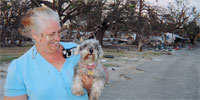 She waved frantically as she walked out from among the roots of the trees. Fardad could now see that she was a heavy set woman of about 250-300 pounds and she was carrying a small lap dog. After giving her some food and water, Fardad learned that she was one of the few who had stayed behind and refused evacuation initially. She waved frantically as she walked out from among the roots of the trees. Fardad could now see that she was a heavy set woman of about 250-300 pounds and she was carrying a small lap dog. After giving her some food and water, Fardad learned that she was one of the few who had stayed behind and refused evacuation initially.
She described the power of the wind to Fardad, telling him that the only reason she wasn't sucked out of her home was because she had gone under and held onto her piano. Her dog had been lost in the storm. After the winds, the national guard came back for her, and told her that now a 35 foot wall of water was headed her way and that she had to get out. 6 of her neighbors decided to stay, having been through past hurricanes they had thought the worst was over. But she took the advice and was evacuated. The next day, she was brought back to where her home was and they gave her some food and water and said they would check in on her a few days later. 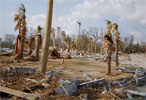 She took Fardad back to show him her house. She went on to say that none of her neighbors made it, and when she was brought back to where her house once stood, there was nothing except the 3 white concrete steps, and who should be sitting at the top of the steps, but the little dog! She took Fardad back to show him her house. She went on to say that none of her neighbors made it, and when she was brought back to where her house once stood, there was nothing except the 3 white concrete steps, and who should be sitting at the top of the steps, but the little dog!
Now she was afraid that she had been forgotten and was out of food and water. Fardad called the center on his cellphone and reported the location and the situation, and after he was sure someone would come out to the lady in blue, he left her.
He continued to make his way down the coast, when he spotted a pickup truck sitting in the spot of one of the countless destroyed homes. In the truck were 2 young women, sitting and crying.
As he approached the pickup Fardad did not know what to expect anymore, so he asked, "Are you allright?"
They wiped the tears from their faces and said they were fine. He asked them what they were doing there, and the said they were trying to decide what to do next. To move from the area, or to stay. Fardad asked if they had had any water. They said not for a few days, and when Fardad offered them some water, they firmly declined, saying that they weren't thirsty. Not understanding this, Fardad's taarof gene kicked in and he insisted, and they finally agreed to share one bottle. Undeterred Fardad decided to wear them down slowly. He talked to them and let them talk to him, and as sobbing slowly stopped, and they felt a bit better, he went back to his car to get them some water confident his ploy had worked and believing they would take it from him now.
Another thing about Fardad is that he is, for lack of a better term, a snacker. He always has a bag of ajeel, or raisins, some kind of snack nearby at all times.
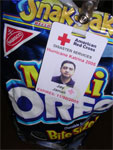 "Hey do you guys want some Oreos?" he yelled as he grabbed the bag and some water and headed back to the 2 girls in the truck. When he got back to them, they looked stunned. Aha! He had found the one thing that apparently no American under distress can say no to, the one thing they didn't know they needed. Oreos represent normalcy. A familiar thing that you know. And they desperately needed that now. "Hey do you guys want some Oreos?" he yelled as he grabbed the bag and some water and headed back to the 2 girls in the truck. When he got back to them, they looked stunned. Aha! He had found the one thing that apparently no American under distress can say no to, the one thing they didn't know they needed. Oreos represent normalcy. A familiar thing that you know. And they desperately needed that now.
They talked some more, and after more cookies and water they got ready to leave and drove off as Fardad went back to his car to put the cooler away. They stopped and got out of the car and walked back to Fardad. He looked at them asking if they had forgotten something. The said they wanted to give him a hug. And they did.
After his standard tour as a volunteer was over, his flight back home to San Jose stopped in Houston to change planes. Fardad went into a gift shop to buy his wife the traditional gift he always buys her anytime he goes on a business trip.
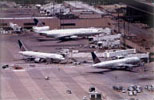 As he browsed the shop he noticed the name tag on the clerk was "Behnam", and after the perfunctory "Eh, shoma Iroony hasteen?" struck up a conversation in Persian with the shopkeeper. As he browsed the shop he noticed the name tag on the clerk was "Behnam", and after the perfunctory "Eh, shoma Iroony hasteen?" struck up a conversation in Persian with the shopkeeper.
After the heat and humidity, being inside an air conditioned terminal, Fardad was now chilly and was wearing his red cross jacket. Behnam asked him where he was coming from and where he was going. Fardad told him he was returning to San Jose after working in the disaster.
"Oh, so your company sent you?" He asked, almost sure of it. "No, I went as a volunteer", Fardad replied. Impressed, Behnam went on to say what a noble thing it was and that all Iranians should do the same.
"Of course, I could never go myself" Behnam chided, "my wife would never allow me to be gone for so long." He said, "Are you married?" he asked. Fardad nodded. "Yeah, I could never leave to do something like that, because I have 2 kids." He said. "Do you have any kids?" He asked. "3" Fardad replied.
"Really? My kids are 12 and 14, so I can't leave them with my wife."How old are your children?" he asked digging himself deeper and deeper. "A 6 year-old, a 4 year-old, and a 6-month old." Fardad replied a grin forming on the inside. Behnam looked at him puzzled, speechless. The kind of look that said without saying it, "Magar Shoma Divaneh Hastee?" (Are you crazy?) Finally Fardad let him off the hook he was dangling from and said, "Well, thanks for the chat, but I have to go catch my flight now." And left the shop and Behnam. Swaying in the wind.
 Fardad was able to clarify the reality of typical response during a disaster as severe as Katrina. Much of the media has focused on FEMA's failure during the crisis. As Fardad explained, the standard escalation protocol is for local authorities to respond to a crisis, after that it is escalated to the state, then finally to the federal level. Fardad was able to clarify the reality of typical response during a disaster as severe as Katrina. Much of the media has focused on FEMA's failure during the crisis. As Fardad explained, the standard escalation protocol is for local authorities to respond to a crisis, after that it is escalated to the state, then finally to the federal level.
It took a full day for each level to realize that the crisis was far beyond anyone's ability to respond. In fairness, this explains the 3-4 days it took for FEMA to finally respond to Katrina. The sheer destruction and the number of displaced was beyond anything anyone could have imagined.
That combined with a 25 year policy of "less government" as voted by Americans, gets you what exactly what you paid for. A weak overall response to a catastrophic event even though it was somewhat predicable, and highly probable. A perfect example of a society that is simply unwilling to spend disaster preparation and prevention costs.
On the flight back home, Fardad couldn't help but think about how prepared we are here in California for the next big earthquake that everyone expects sooner or later. I asked him how prepared he thought California is compared to Louisiana, Mississippi, or Florida. "Better, but not by much" was his answer.
Fardad's advice to all of us is to ask yourself how prepared you or your company or your town or city are. Have 5 days of food and water (not the 3 days recommended). Develop a security plan for your home and family.
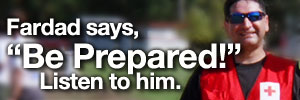 Finally, I asked Fardad, why with 3 kids, a wife, a business to run, did he volunteer to go to Katrina. His answer was simple, “How can I expect other volunteers from other states to come to my aid if I was not willing to go theirs? Finally, I asked Fardad, why with 3 kids, a wife, a business to run, did he volunteer to go to Katrina. His answer was simple, “How can I expect other volunteers from other states to come to my aid if I was not willing to go theirs?
If you would like to learn more about emergency preparedness, and how you and your family can be better prepared for an emergency, or would just like to send an email to Fardad Jamali, you can email him at: jayjam@envirosafetech.com. |